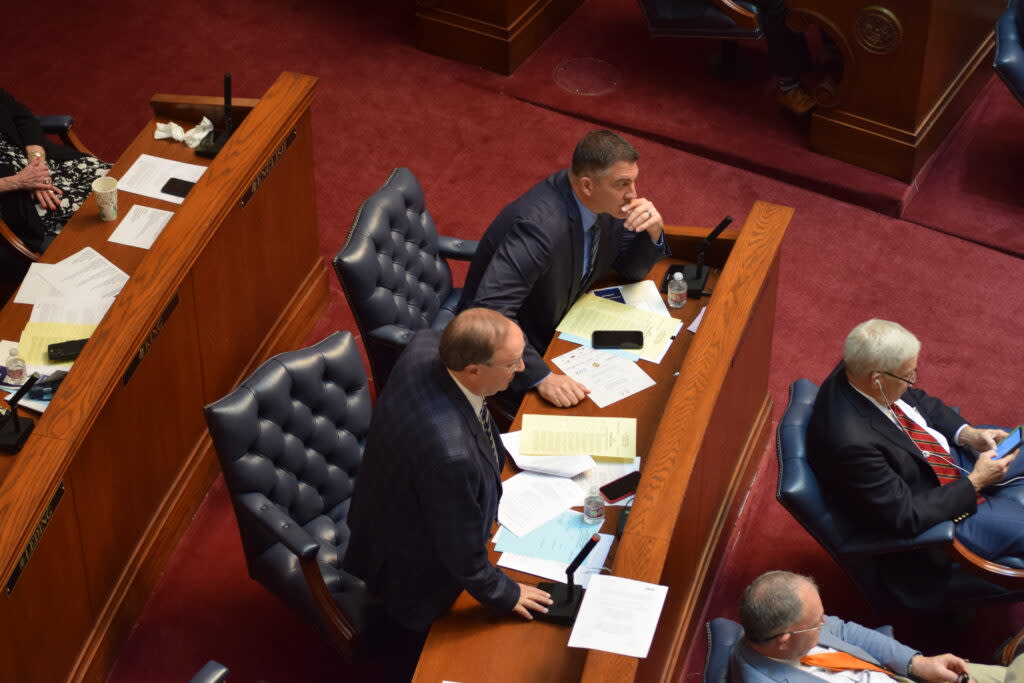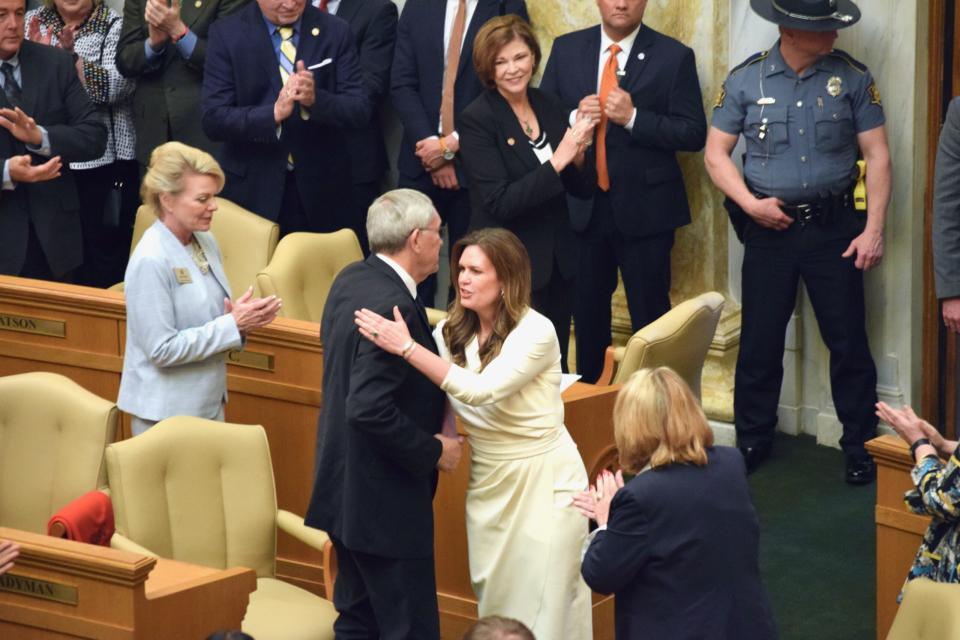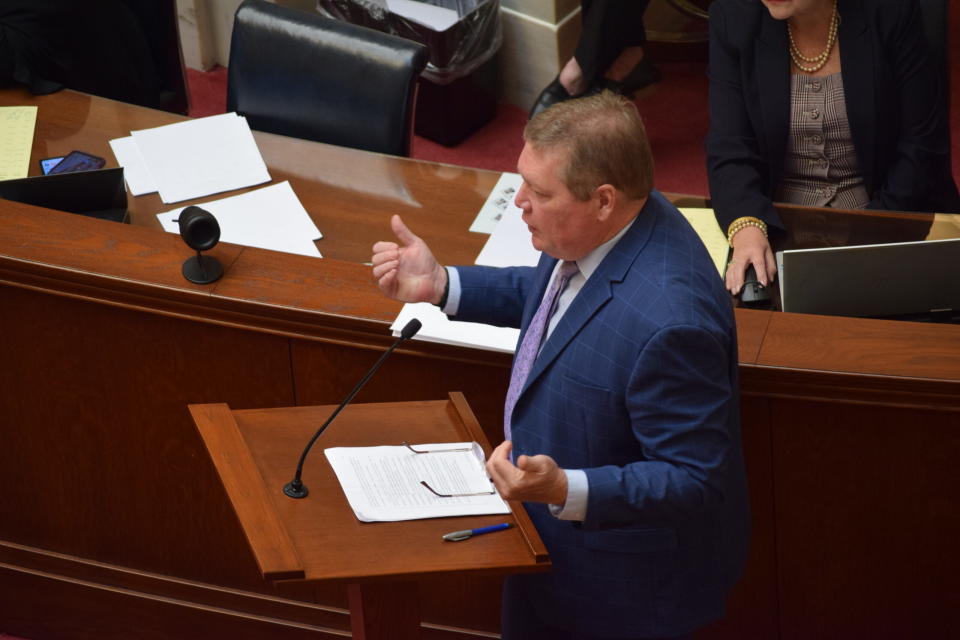SESSION SNAPSHOT: 2024 fiscal session gets underway in Little Rock

- Oops!Something went wrong.Please try again later.
Sens. Mark Johnson (left) and Clint Penzo listen to their colleagues discuss cryptocurrency mining legislation during an Arkansas Senate meeting on April 11, 2024. (Antoinette Grajeda/Arkansas Advocate)
Arkansas lawmakers returned to the Capitol Wednesday for the start of the state’s eighth fiscal session. Held in even-numbered years, fiscal session work is focused on finalizing the state budget.
Legislative sessions occur in odd-numbered years, but lawmakers can take up non-appropriation matters during the fiscal session with a two-thirds majority vote in each chamber.
The fiscal session lasts a maximum of 30 days unless three-fourths of the Arkansas Legislature votes to extend it. Legislative leadership has said they expect the session to be straightforward and wrap up in less than three weeks.
Throughout April lawmakers will consider the governor’s proposed $6.3 billion general revenue budget. The proposed 1.76% increase of $109 million, if approved by the Legislature, would be a significantly smaller increase to the state budget than what has been proposed in recent years.
1) State of the State
In her first State of the State address, Gov. Sarah Huckabee Sanders touted the success of legislation targeting education and public safety, her two biggest priorities during her first year in office.
About $100 million of the governor’s proposed budget increase will support initiatives in the LEARNS Act, Sanders’ signature law that made wide-ranging changes to the Arkansas’ education system, including raising the state’s minimum teacher salary to $50,000 and creating a school voucher program.
Arkansas Gov. Sarah Huckabee Sanders shakes hands with Rep. Jack Ladyman, R-Jonesboro, as she enters the Arkansas House to give her first State of the State address on April 10, 2024. (Antoinette Grajeda/Arkansas Advocate)
The Educational Freedom Account program allows state funds to be used for allowable education expenses, such as private school tuition. Roughly 60% of the state budget’s proposed increase is directed toward the EFA program.
Sanders’ budget proposal also includes $3.8 million to “replenish” the ranks of the Arkansas State Police. Sanders said she wants to add 100 new officers to the force.
Sanders also lauded several other policies enacted during her first year, including two laws cutting income taxes, plans to open a new 3,000-bed prison, an executive order banning certain gender-neutral terms in government documents and a social media age verification law, which has been temporarily blocked in court.
2) Correctional costs
The Legislature’s Joint Budget Committee on Thursday debated whether to give the state Department of Corrections extra money during the current fiscal year to be distributed to county jails as reimbursement for housing state prisoners.
Sanders sent a letter to lawmakers requesting the approval of $4.2 million in general revenue funds for jail reimbursements for the 2024 fiscal year, which ends June 30.
Need to get in touch?
Have a news tip?
The legislative panel ultimately approved the requested funds, but Sen. Jimmy Hickey, R-Texarkana, took issue with approving the total amount after the state budget director said the Department of Corrections likely needed closer to $3 million because fewer inmates have been kept in county jails than originally predicted.
Hickey also voted against the request because he said he disapproved of the committee giving state agencies money that would carry over from one fiscal year to another.
Sen. Linda Chesterfield, D-Little Rock, said she supported the $4.2 million appropriation in case $3 million would not be enough.
3) Cryptocurrency mining
The Arkansas Senate laid the groundwork for considering legislation that falls outside the scope of the fiscal session by approving resolutions to amend the state employee pay plan as well as a 2023 law that limited the state’s ability to regulate cryptocurrency mining operations.
Crypto mines are large groups of computers that harvest digital currency and are often located in rural areas because they take up a lot of space. A significant amount of electricity is also needed to keep the computers running and water to cool them.
The crypto-focused resolutions propose implementing noise limits, prohibiting ownership by foreign entities and requiring licensure by the Department of Energy and Environment.
Seven of eight proposed crypto mining resolutions passed the Senate. Sen. Bryan King, R-Green Forest, sponsored six of the resolutions, including the one that did not pass.
Sen. Bryan King, R-Green Forest, sponsored six of eight resolutions on cryptocurrency mining taken up by the Arkansas Senate on April 11, 2024. (Antoinette Grajeda/Arkansas Advocate)
To introduce legislation unrelated to the state budget during the fiscal session, lawmakers must file resolutions proposing the legislation by the end of the first day of the session. Both chambers of the Arkansas Legislature must then approve the resolutions with a two-thirds majority vote.
The Senate-approved resolutions will be heard by the House on Monday and must be approved by a two-thirds majority vote there in order for bills to be filed and assigned to committees for further discussion.
The Arkansas House and Senate are both scheduled to convene at 1 p.m. on Monday.
GET THE MORNING HEADLINES DELIVERED TO YOUR INBOX
The post SESSION SNAPSHOT: 2024 fiscal session gets underway in Little Rock appeared first on Arkansas Advocate.



